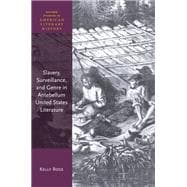Slavery, Surveillance, and Genre in Antebellum United States Literature argues for the existence of deep, often unexamined, interconnections between genre and race by tracing how surveillance migrates from the literature of slavery to crime, gothic, and detective fiction. Attending to the long history of surveillance and policing of African Americans, the book challenges the traditional conception of surveillance as a top-down enterprise, equally addressing the tactics of sousveillance (watching from below) that enslaved people and their allies used to resist, escape, or merely survive racial subjugation.
Examining the dialectic of racialized surveillance and sousveillance from fugitive slave narratives to fictional genres focused on crime and detection, the book shows how these genres share a thematic concern with the surveillance of racialized bodies and formal experimentation with ways of telling a story in which certain information is either rendered visible or kept hidden. Through close readings of understudied fugitive slave narratives published in the 1820s and 1830s, as well as texts by Edgar Allan Poe, Herman Melville, Frederick Douglass, Hannah Crafts, and Harriet Jacobs, Ross analyzes the different ways white and black authors take up these issues in their writing--from calming white fears of enslaved rebellion to abolishing slavery--and demonstrates how literary representations ultimately destabilize any clear-cut opposition between watching from above and below. In so doing, the book demonstrates the importance of race to surveillance studies and claims a greater role for the impact of surveillance on literary expression in the US during the era of slavery.








